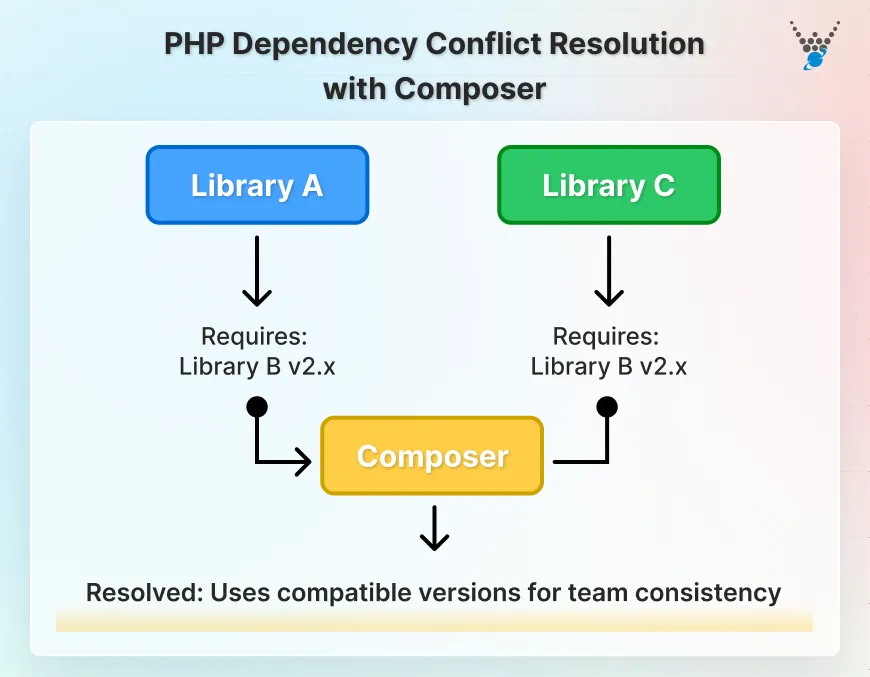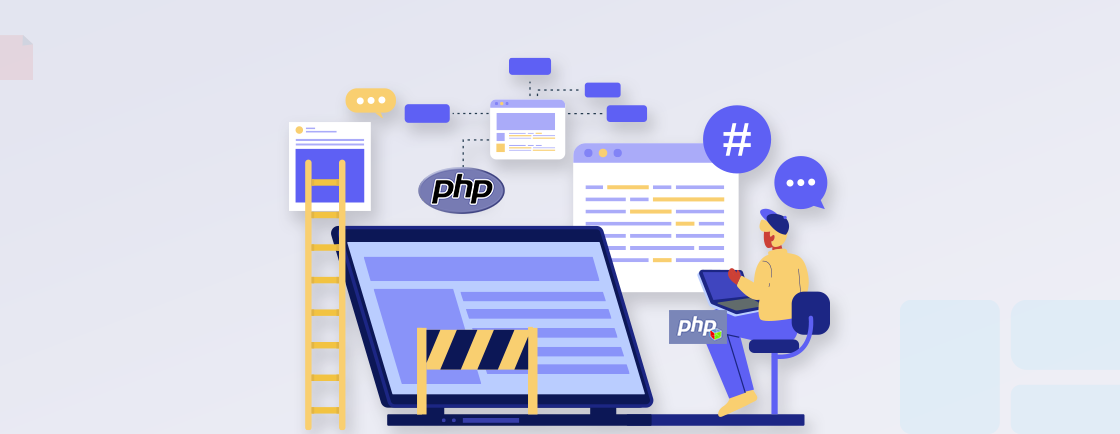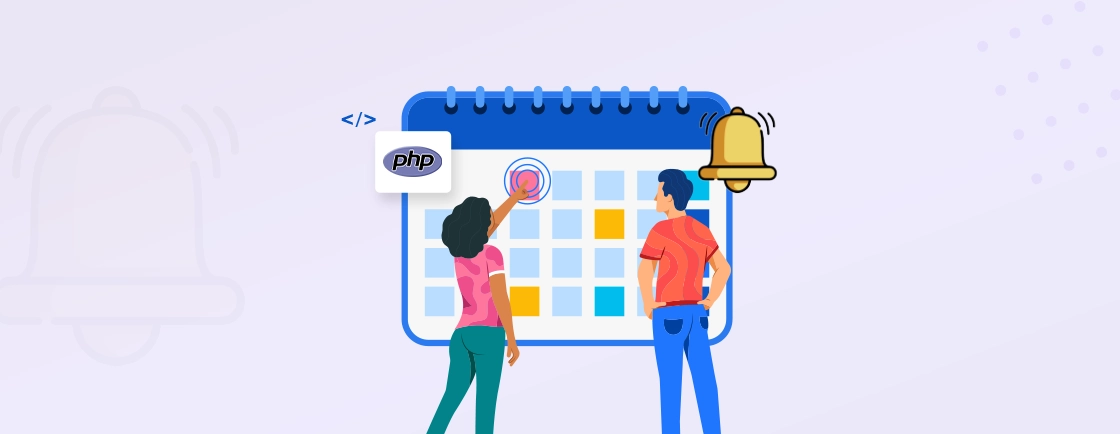Quick Summary
PHP dependency management uses Composer, a tool for declaring, managing, and installing external packages. Composer simplifies PHP project setup, helps code reuse, and ensures consistent environments by integrating and maintaining third-party code. Know more about using Composer and handling dependency manager in PHP in this article.
Table of Contents
PHP dependency management has transformed how developers use third-party libraries and maintain code quality. This is possible with Composer, the standard tool that completely changed dependency management for PHP projects.
In this article, developers will learn how to use strong dependency management strategies. Along with this, you will also know how to improve security, performance, and maintainability through case studies and useful examples.
What Is PHP Dependency Management?
PHP Dependency Management involves planning and managing external libraries, packages, and components for your PHP project. Applications rarely live alone in modern PHP development. They use many third-party libraries for database connections, HTTP requests, logging, and caching. Composer is a dependency manager for PHP that simplifies this process.
PHP developers used to manually download libraries, extract files, and manage include paths, which was tedious. Developers struggled to manage transitive dependencies, security holes in old packages, and incompatible versions. Handling dependencies manually created “dependency hell,” where updating one library could break many app parts.
Further, a PHP dependency manager was much needed when handling dependencies manually. It can be difficult to ensure that all development teams use the same library versions, track security updates for multiple packages, and manage complicated dependency trees.

For example, where Library A needs Library B version 2.x, but Library C needs Library B version 1.x. In these cases, PHP Composer makes sure that everyone on the team uses the same library versions. Because these issues slow development and affect application stability, a dependency manager for PHP is necessary.
Why Composer Is Important for PHP Dependency Management?
Composer is the most common way to handle PHP dependencies right now. This PHP package manager is a must-have for modern PHP development, ranking among the top PHP development tools for its ability to automate library management. Packagist, Composer’s main repository, gets more than 1.4 billion download requests every month, which shows how in-demand it is.
Apart from that, Composer is a PHP dependency manager that automatically resolves dependencies, manages version constraints, supports PSR-4 autoloading, scans for security vulnerabilities, and works well with CI/CD. Almost all modern PHP frameworks use Composer to manage dependencies, such as Laravel, Symfony, and Drupal.
Understanding Composer’s Role in a PHP Project
What Is Composer?
Composer is an application-level dependency manager for PHP. Unlike system-wide package managers, Composer manages dependencies for each project. In other words, every app has its own set of dependencies. Further, Composer adds a number of useful tools for managing PHP dependencies.
For security, it uses cryptographic verification and vendor namespacing to keep package names from clashing. In version control systems, it keeps metadata separate from code. So, this PHP dependency manager is not the same as PEAR. Dependencies for PHP Composer projects are stored in the vendor/ directory, ensuring they remain isolated on the best server for PHP development chosen for the project.
How Does Composer Work as a Dependency Manager for PHP?
To get a handle on PHP Composer, you need to know these three core parts:
- composer.json: This file has the rules for autoloading, the dependencies for the project, and the settings for the configuration. Semantic versioning tells you which packages you need and which ones you can’t have.
- composer.lock: This important file has the exact versions of the packages and libraries they need. By locking dependencies to certain versions, it makes sure that builds can be done again in different environments.
- Packagist: Packagist is the main public PHP package manager repository. GitHub or GitLab hosts the code, but Packagist indexes PHP packages and connects them to their source repositories on GitHub or GitLab.
The steps for installing Composer are as follows:
First, after the composer install, process, Composer looks for dependencies in the composer.json file. It then resolves the dependency tree, determining which package versions satisfy all constraints. Next, it looks for the composer.lock file and installs the exact versions that are listed there. Finally, Composer downloads packages to the vendor/ folder and makes files that load themselves.
This workflow makes sure that deployments are always the same. The composer.lock file has all the dependencies that developers, testing environments, and production servers need.
How to Set Up Composer in Your PHP Project?
1. Installation
Installing Composer in PHP projects is simple on all operating systems, but the steps vary.
For Windows Installation:
Download Composer-Setup.exe from getcomposer.org to install on Windows. Run the installer to find your PHP installation and add Composer to PATH. The PHP composer setup takes a few minutes and requires little configuration.
For macOS and Linux Installation:
Install Composer using the command-line installer on Mac and Linux:
php -r "copy('https://getcomposer.org/installer', 'composer-setup.php');"
php -r "if (hash_file('sha384', 'composer-setup.php') === 'INSTALLER_HASH') { echo 'Installer verified'; } else { echo 'Installer corrupt'; unlink('composer-setup.php'); } echo PHP_EOL;"
php composer-setup.php
php -r "unlink('composer-setup.php');"
After these commands, you download the installer, verify it with a hash, install Composer, and remove the setup file. Installing Composer for PHP makes sure you’re using real software.
Global vs. Local Installation:
Put the Composer executable in the binary directory of your system so that anyone can use it:
mv composer.phar /usr/local/bin/composer
With the global install composer in the PHP command, you can run composer commands from any folder. When you install Composer on your own computer, it stays in your project directory. This is helpful when using shared hosting with limited system permissions.
2. Creating composer.json
Start a PHP dependency management project with composer init. This command requests the package name, description, author, minimum PHP version, and initial dependencies.
Make your composer.json file:
{
"name": "vendor/project-name",
"description": "Project description",
"type": "project",
"require": {
"php": ">=8.0",
"monolog/monolog": "^3.0"
},
"require-dev": {
"phpunit/phpunit": "^10.0"
},
"autoload": {
"psr-4": {
"App\\": "src/"
}
}
}
The require section lists production dependencies, while require-dev contains development-only packages like testing frameworks and code quality tools.
3. Adding Dependencies
The PHP Composer require command simplifies adding new packages. Instead of manually editing composer.json, execute this
composer require vendor/package-name
This command updates composer.json, downloads the package, resolves any new dependencies, and updates composer.lock.
For development dependencies, use the –dev flag:
composer require --dev phpunit/phpunit
Version-specific installations use colon notation:
composer require monolog/monolog:^3.0
4. Updating Dependencies
PHP dependency management requires regular updates for security patches and feature improvements. The composer update command refreshes dependencies based on version constraints in composer.json.
Update all packages:
composer update
Update specific packages:
composer update vendor/package1 vendor/package2
Update production dependencies only (excluding dev packages):
composer update --no-dev
Critical distinction: composer update modifies composer.lock with new versions, while composer install uses existing versions from composer.lock. Use update during development when you want newer versions. Use install in production to maintain consistency.
Best practice recommends running composer update regularly during development, but testing thoroughly before production deployment. The 2025 PHP development guidelines recommend weekly dependency updates for active projects.
5. Removing Dependencies
Remove unnecessary packages using composer remove:
composer remove vendor/package-name
This command deletes the package entry from composer.json, uninstalls the package from vendor/, updates composer.lock, and removes unused sub-dependencies.
For multiple package removal:
composer remove vendor/package1 vendor/package2
Always commit the updated composer.json and composer.lock files after removing dependencies to maintain consistency across environments.
How to Autoload According to PSR Standards?
1. Autoloading Basics
PHP Composer revolutionized class loading through automatic file inclusion. Instead of manual require statements for every class, Composer generates an autoloader that handles all class loading automatically.
Include the autoloader in your application’s entry point:
require __DIR__ . '/vendor/autoload.php';
This single line provides access to all installed dependencies plus your application’s classes defined in the autoload section of composer.json.
Composer supports multiple autoloading strategies: PSR-4 (recommended), PSR-0 (legacy), classmap (performance-optimized), and files (for function libraries).
2. PSR-4 Autoloading
PSR-4 represents the dependency manager for php industry standard for autoloading. It maps namespace prefixes to directory paths, creating predictable class location patterns.
Configure PSR-4 autoloading in composer.json:
{
"autoload": {
"psr-4": {
"App\\": "src/",
"App\\Models\\": "src/Models/"
}
}
}
This configuration maps the App\ namespace to the src/ directory. A class App\Models\User must exist at src/Models/User.php.
PSR-4 offers significant advantages over PSR-0: it eliminates redundant directory structures, improves performance by reducing filesystem checks, and provides clearer namespace-to-directory mappings. After modifying the autoload configuration, regenerate the autoloader:
composer dump-autoload
3. Strict PSR Validation (Advanced)
Production environments benefit from optimized autoloading. The –classmap-authoritative flag creates a comprehensive class map during deployment:
composer dump-autoload --classmap-authoritative
This optimization prevents filesystem lookups, improving performance significantly. However, it requires regenerating the autoloader when adding new classes.
The –apcu flag leverages APCu caching for additional performance gains:
composer dump-autoload --apcu
For large applications, these optimizations can reduce autoloader overhead by 40% or more, according to performance benchmarks.
What Advanced Composer Features are Important?
1. Composer Scripts
Automate repetitive tasks using Composer scripts. Define custom commands in composer.json:
{
"scripts": {
"test": "phpunit",
"lint": "phpcs --standard=PSR12 src/",
"deploy": [
"composer install --no-dev",
"composer dump-autoload --classmap-authoritative"
]
}
}
Execute scripts via:
composer test
composer deploy
Scripts streamline development workflows, ensuring consistent execution of common tasks across team members.
2. Security Auditing
Since Composer 2.4, the audit command identifies known security vulnerabilities in dependencies:
composer audit
This PHP dependency manager feature queries Packagist’s Security Advisory API, reporting CVE identifiers, affected versions, and advisory links. The audit runs automatically during composer update and composer install, providing immediate security feedback.
For CI/CD integration, composer audit exists with a non-zero status when vulnerabilities exist, allowing pipelines to fail builds with security issues. Industry data shows organizations using regular security audits reduce vulnerability exposure by 70%.
3. Provenance and Integrity Checks
PHP dependency management security extends beyond vulnerability scanning. Composer verifies package integrity through multiple mechanisms:
- HTTPS enforcement: All package downloads use encrypted connections, preventing man-in-the-middle attacks.
- Checksum verification: Composer validates downloaded packages against stored checksums, detecting tampering.
- Vendor namespacing: Packagist’s mandatory vendor namespacing prevents dependency confusion attacks that affected NPM and PyPI.
Unlike NPM, which hosts package code directly, Packagist stores only metadata while actual code resides on version control systems like GitHub. This architecture provides transparency – package contents can be audited and verified through their source repositories.
4. Custom Repositories
Private packages require custom repository configuration. Configure private repositories in composer.json:
{
"repositories": [
{
"type": "vcs",
"url": "https://github.com/company/private-package.git"
},
{
"type": "composer",
"url": "https://packages.example.com"
}
]
}
For authentication, use environment variables or auth.json:
{
"http-basic": {
"packages.example.com": {
"username": "token",
"password": "secret-token"
}
}
}
Private Packagist comes with commercial hosting for private packages with team management and access control. Partner with a PHP development company to get started with your project quickly.
5. Environment-Specific Dependencies
Configure platform requirements using config.platform settings. Override detected PHP version and extensions:
{
"config": {
"platform": {
"php": "8.0.0",
"ext-redis": "5.3.0"
}
}
}
This configuration ensures dependency resolution matches your production environment, even when developing on different PHP versions.
Composer PHP Dependency Manager Best Practices
1. Semantic Versioning
Effective PHP dependency management requires understanding semantic versioning (SemVer). Version numbers follow the format MAJOR.MINOR.PATCH:
MAJOR: Incompatible API changes
MINOR: Backward-compatible functionality additions
PATCH: Backward-compatible bug fixes
Version constraints use operators:
- ^1.2.3 allows >=1.2.3 and <2.0.0 (recommended)
- ~1.2.3 allows >=1.2.3 and <1.3.0
- 1.2.* allows >=1.2.0 and <1.3.0
- >=1.2.3 allows any version >=1.2.3
The caret (^) operator provides optimal flexibility while preventing breaking changes. It’s the recommended constraint for most dependencies.
2. Lock File Management
The composer.lock file is PHP dependency management’s most critical component. It records exact dependency versions, ensuring reproducible builds across all environments.
- Always commit composer.lock: Every team member and deployment environment must use identical dependency versions. Without composer.lock, running composer install might fetch different versions, introducing inconsistencies.
- Never manually edit composer.lock: Composer generates this file automatically. Manual modifications break integrity checks and cause installation failures.
- Update regularly in development: Run composer update frequently during development to incorporate security patches. Test thoroughly before committing updated composer.lock.
Studies show projects using proper lock file management experience 30% fewer environment-related bugs and 20% faster debugging cycles.
3. Regular Updates
Maintain security and compatibility through regular dependency updates. Delayed updates create technical debt—accumulating outdated dependencies makes future updates increasingly risky.
Establish update schedules:
- Weekly: Review and apply security updates
- Monthly: Update minor versions of key dependencies
- Quarterly: Consider major version updates after thorough testing
Before updating production, test in staging environments. Use semantic versioning constraints to minimize breaking changes while allowing security patches.
4. CI/CD Integration
Integrate PHP Composer into continuous integration/deployment pipelines. Sample GitLab CI configuration:
before_script:
- composer install --no-dev --optimize-autoloader
test:
script:
- composer audit
- vendor/bin/phpunit
deploy:
script:
- composer dump-autoload --classmap-authoritative
- rsync -av . user@server:/path/to/app
This configuration installs dependencies, runs security audits, executes tests, and optimizes autoloading before deployment.
CI/CD integration with PHP Composer provides automated testing and consistent deployments, which are essential components of a robust CI/CD for PHP workflow. Organizations implementing Composer in CI/CD pipelines report 40% faster deployment times and 50% fewer production issues.
Case Study: Use Composer in a Large-Scale Laravel Project
Context
A financial services company developed a Laravel-based loan management system handling thousands of daily transactions. The application required:
- 50+ third-party packages for payment processing, PDF generation, and reporting
- Multiple development teams across time zones
- Strict regulatory compliance requiring audit trails
- Monthly security audits and dependency updates
Problem
Initial PHP dependency management used manual processes. Developers downloaded packages individually, resulting in:
- Inconsistent package versions across development, staging, and production
- 6+ hours monthly spent manually updating dependencies
- Three production incidents from incompatible package versions
- Failed security audits due to outdated, vulnerable packages
- Difficulty onboarding new developers (2-3 days setup time)
Solution
The team implemented comprehensive Composer-based PHP dependency management:
- Centralized dependency management: All packages declared in composer.json with semantic version constraints.
- Lock file enforcement: composer.lock committed to Git, ensuring identical versions across all environments.
- Automated security auditing: CI/CD pipeline running composer audit on every commit, failing builds with vulnerabilities.
- Private package repository: Internal packages hosted on Private Packagist with access control.
- Optimized production builds: Deployment script using:
composer install --no-dev --optimize-autoloader --classmap-authoritative
- Documented update procedures: Monthly dependency update schedule with staging environment testing.
Results
After implementing proper PHP dependency management:
- Development efficiency: New developer onboarding reduced from 2-3 days to 30 minutes (94% improvement).
- Deployment consistency: Zero production incidents from dependency version mismatches over 12 months.
- Security posture: 100% security audit pass rate. Automated composer audit identified and resolved 12 vulnerabilities before reaching production.
- Performance: Application bootstrap time reduced by 35% through autoloader optimization.
- Time savings: Dependency update time decreased from 6+ hours to 45 minutes monthly (87.5% reduction).
- Cost reduction: Infrastructure costs lowered 15% from improved autoloader performance, reducing server load.
Would you like to achieve similar results in your project? Hire PHP developer today and get started with Composer integration in no time!
Final Remarks
Managing dependencies with PHP Composer changes how projects are managed. In this guide, we talked about installing dependencies, PSR-4 autoloading standards, security checks, fixing problems, and using it in the real world. It is important for a good PHP dependency manager to use semantic versioning, keep lock files up to date, automate security audits, boost performance, and work with CI/CD pipelines.
These best practices will help you make PHP apps that are safe, quick, and easy to maintain, be it if you are learning how to manage PHP dependencies or you are trying to make big apps run better. Companies that spend money on setting up and training staff on PHP Composer see faster development, better security, and more reliable operations. The rules and tips in this article can be used to handle PHP dependencies of any size!
FAQs
Which is the PHP dependency manager?
Composer is the most common and widely used dependency manager for PHP projects. It lets developers automate the installation and upkeep of libraries that are needed. Composer makes it easier to set up projects and helps avoid problems like version conflicts.
How do you manage dependencies in a PHP project?
You can manage your dependencies by making a composer.json file that lists the libraries you need. Then, you can use Composer commands to install and update them, which makes sure that all of your code and versions are the same. Composer also makes an autoloader that makes it easy to use and keeps your libraries up to date for security and performance.
Is Composer dependency manager for PHP the only option?
Composer is the best and most up-to-date way to manage PHP dependencies. There are older tools like PEAR, but they aren’t used much anymore because Composer is so efficient and has such a large ecosystem. Composer is still the best choice because it has advanced features and works with most projects. You can install Composer on Laravel and there is a guide for that too.
Need Help Managing PHP Dependencies?
Our experts can guide you in setting up and optimizing Composer for seamless PHP development and maintenance.





